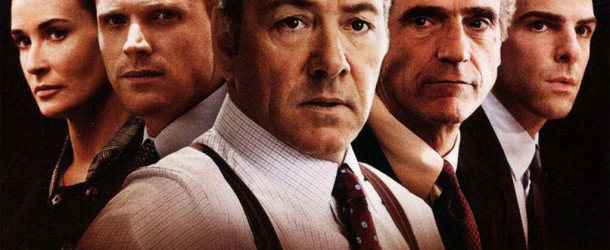I had a dream the other night. In my dream, people decided that the movie theatre was the next site for occupation by concerned and angry citizens. I woke up and thought, "That's a great idea!" Certainly protest in a movie theatre is not as highly visible as that in the street, but perhaps equally as relevant. Movies are as much about money as any major corporations. That's who actually makes them. The largest entertainment corporations in the world -- Disney, Time Warner, Viacom and Rupert Murdoch's evil News Corps make up a goodly portion of the Fortune 500, as well as supplying entertainment to the masses.
This isn't news to anyone, but stupid old Hollywood, ever helpful, has supplied a number of films lately to inflame the ire of the people. Tower Heist in which Eddie Murphy and Ben Stiller strike a blow for the put-upon common man opens next week. The press bumpf for the film describes it as "A comedy caper about working stiffs who seek revenge on the Wall Street swindler who stiffed them." Who writes this stuff, and how did we get back to the dirty '30s exactly? Despite its threadbare premise, Tower Heist had the unfortunate role of revealing the films are always fundamentally about money, and most especially about profit.
Universal Pictures' decision to release Tower Heist on VOD (Video on Demand) in theatres a few short weeks after its release in theatres prompted a protest on the part of theatre owners who threatened a boycott. Patrick Goldstein writing in the Los Angeles Times explicated the battle thusly: "So why are exhibitors and studios engaged in such a bare-knuckled public brawl? In short, because the warring parties now have radically different business models. The studios are focused on sucking as much money as possible out of the back end. But exhibitors don't get a cut of movies' video or TV revenue; they live -- or die -- by how well films do in theaters."
Which is kind of amusing when you consider that the film's entire plot hinges on the idea greed is bad. Add in the idea that a film about working stiffs sticking it to the rich fat cat was financed, made, and starred in by those very same cats, and you've got a bit of a funny old situation, probably funnier than the film itself.
While these two sides tussle over who gets the greater portion of the audience members' ticket price, there are larger forces at work. The tidal change from the traditional modes of making and distributing films continues to shift, and with it the older ways of doing things fall away.
Caught in the middle, as always, are the little people, trying to hold onto their little jobs and their tiny bits of money.
Pity the poor investment banker
While Tower Heist extols the virtues of robbing for justice, JC Chandor's debut feature Margin Call charts the tsunami of financial crisis through the experience of one investment banking company. Reading the reviews for Margin Call, it's hard not to roll your eyes. Here the perpetrators of financial meltdown, the architects of what the OWS protestors are getting tear-gassed in the streets over, are asking for your sympathy. Scenes of sad bankers staring wanly out from their glass and steel towers at the streets below, wringing their hands over the devastation that they themselves have wrought is a little galling. Even more so is said bankers sermonizing about the fact that most people live lives of obscurity and desperation, unaware of the forces that control them.
The film has been lauded by American film critics for its attempt to humanize investment bankers, played variously by Kevin Spacey, Jeremy Irons, Stanley Tucci, and Demi Moore. If the idea of feeling sorry for Demi Moore makes you want to commit ritual disembowelment, I share your pain. But my point is that placing the people who ostensibly caused the "occupy everything" movement up there on the big screen, asking in effect for audience sympathy, is offensive. Especially coming from an industry that is engaged in shedding people and jobs in order to protect the bottom line.
The world is changing. Increasingly I find it is difficult to watch mainstream film, mostly because it seems like an enormous waste of time, resources, and yes, it must be said, money. All this time and effort and endless amounts of financing to produce something like Tower Heist, that will spend a few weeks in the theatre, then wander away to wither in the sad old country of DVDS, which no one buys anymore anyway. Or worse, go into heavy rotation on cable networks offered in low rent hotel rooms. If you want to see anything genuine, get thee to a film festival, where vital and violent pockets of ideas, unrest and goddamn art still reside.
Occupy the Bat Cave
But even in these recessionary days, big films still command big budgets. Christopher Nolan's next installation of Batman has a reported budget of $250 million dollars. Despite having this amount of coin, the rumor is that Mr. Nolan plans to use the Occupy Wall Street protestors as free background material for certain scenes in the film. This sounds like one of the worst ideas I could imagine. I don't imagine that the protestors will get paid for their usage. In fact I would hope they rise up and take bricks and bats to old Batman.
The divide between movie fiction and reality continues to get weirder every day. The Globe & Mail recently ran a photo gallery in which Hollywood starlets and minor celebrities were shot at various openings, junkets, smiling glassily for the camera. The captions that accompanied the photos were something else. The feature made the Facebook 5000 in a heartbeat and was soon being passed around feverishly. It was genuinely funny, but more importantly, it also pointed out the enormous disconnect between Hollywood fiction and people trying to stay warm and dry, and find a place to pee in the streets of New York City.
Many pundits, most notably Matt Taibbi in a recent post in Rolling Stone have gone to great efforts to maintain that the occupy movement is not about class warfare, but an effort to reestablish the rule of law, and remake a level playing field. I'm not so sure about this. As my mother likes to point out, "No one quite gets it yet." Meaning that the idea that the Wall Street protesters, and the rest of the occupy folks demanding their share, whether that means jobs, a pension plan, or economic benefits, haven’t realized yet that the financial corruption is not the biggest problem humanity has yet to face. Money after all is just a made up idea, an ephemeral thing, a shared and common delusion if you will.
The End
A recent article in good old Harper's Magazine, "Broken Britain: Nothing is Left of the Family Silver" from journalist Ed Vulliamy, lays out the long winding road of sell offs, corruption and Orwellian control that lead to rioting in the streets. The article is a long sustained howl of rage and despair, but it reaches a few stunning coloratura high notes that hang in the air. "Britain's problems are singular: singularly serious, singularly fetid, and singularly vulgar. The country that packages itself as 'Cool Brittannia' has become greedy, obsessed with commercialism at the expense of any other value or norm, xenophobic, belligerent, and hubristic."
Britain invented much of what Western culture is all about, from the Royal wedding to rioting in the streets, and Vulliamy points out, one thing leads irrevocably to another. How long before Kim Kardashian or Donald Trump ends up with their blowsy heads on the guillotine? Maybe not so long... ![]()
Read more: Film

















Tyee Commenting Guidelines
Comments that violate guidelines risk being deleted, and violations may result in a temporary or permanent user ban. Maintain the spirit of good conversation to stay in the discussion.
*Please note The Tyee is not a forum for spreading misinformation about COVID-19, denying its existence or minimizing its risk to public health.
Do:
Do not: